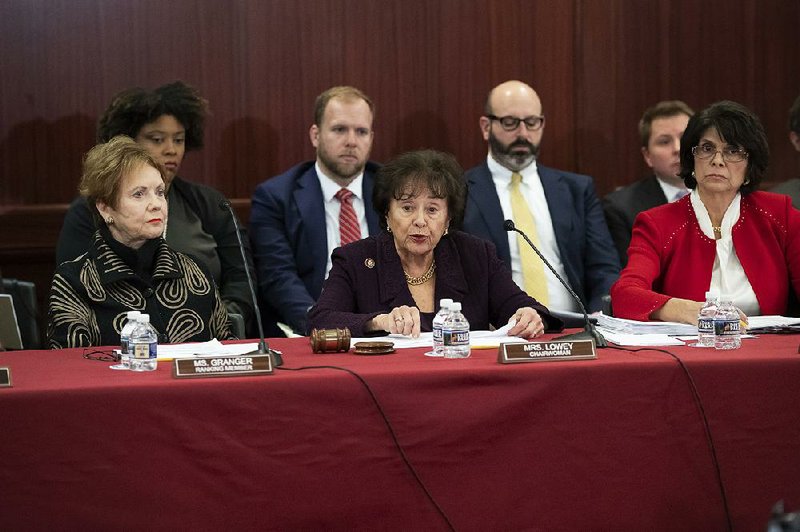WASHINGTON -- Democrats in the House offered a border security plan on Wednesday that would not provide money for a border wall, ignoring -- for now -- an early-morning warning from President Donald Trump that they'd be "wasting their time" if they don't come up with wall money.
The Democratic offer is just a starting point in House-Senate talks on border security funding that kicked off in a basement room in the Capitol. A top Democrat acknowledged that "everything is on the table," including the border barriers demanded by Trump. Lawmakers on both sides flashed signs of flexibility, eager to demonstrate willingness to compromise in hopes of resolving the standoff with Trump that sparked the just-ended 35-day partial government shutdown.
The high-stakes talks are taking place against the backdrop of another possible shutdown in mid-February -- an outcome Trump's GOP allies in the Senate are especially eager to avoid.
Hours before the negotiators were to sit down for their first meeting, Trump tweeted Wednesday morning that the Republicans and Democrats are "Wasting their time!" if they aren't "discussing or contemplating a Wall or Physical Barrier."
Trump's request for $5.7 billion to build about 234 miles of barriers along the U.S. border with Mexico faces uphill odds. Even Trump's GOP allies acknowledge he may only get a fraction of it. The Democratic plan includes new money for customs agents, scanners, aircraft and boats to police the border, and to provide humanitarian assistance for migrants.
"Democrats are once again supporting strong border security as an essential component of homeland security. Border security, however, is more than physical barriers; and homeland security is more than border security," said Rep. Lucille Roybal-Allard, D-Calif.
Senators revisited a bipartisan $1.6 billion proposal for 65 miles of fencing in the Rio Grande Valley in Texas that passed a key committee last year. The panel of lawmakers from the appropriations committees has ample expertise on homeland security issues, as many of them helped finance fencing built over the years that stretches across much of the 1,954-mile border.
"Because of the work we did years ago, we've already built almost 700 miles of fencing on our nation's border," said Rep. David Price, D-N.C. "Whatever the president may say it is far from an open border. Meanwhile, the number of undocumented immigrants crossing our border or attempting to cross remain not at alarming highs but at historic lows."
Republican allies of the president said there will have to be some money to meet Trump's demands. But they also predict privately that the White House is eager to grab an agreement and declare victory -- even if winning only a fraction of Trump's request.
"The components of border security are people, technology and a barrier. And everybody has voted for all three," said Sen. John Hoeven, R-N.D. "To get to an agreement we've got to have all three in there."
But as talks on the homeland security budget open, Trump and Republicans are in a weakened position just 17 days before the government runs out of money again without a deal. Democrats won back the House in the midterm vote and prevailed over Trump in the shutdown battle.
"Smart border security is not overly reliant on physical barriers," House Appropriations Committee Chairman Nita Lowey, D-N.Y., said as the session began. She said the Trump administration has failed to demonstrate that physical barriers are cost-effective compared with better technology and more personnel.
Sen. Richard Shelby, R-Ala., who chairs the Senate Appropriations Committee, said that while Republicans favor improved border security technology, "Smart technology alone does not actually stop anyone from crossing into the U.S. illegally."
Shelby said he hoped the negotiations would yield results.
"I must stress that as long as we remain polarized, we will never resolve our differences on this critical issue that we owe to the American people," he said.
"Our Border Patrol tells us they need physical barriers to help them do their job, not from coast to coast, but strategically placed where traffic is highest," Shelby said. "It is a common-sense, I believe, all-of-the-above solution to a problem that both parties have said for years we have to fix."
Rep. Henry Cuellar, D-Texas, a conference committee member, disagreed. "The wall doesn't work. You can go under. You can climb over. You can go around."
"The bottom line is, is my position is 'no,'" said Cuellar, who represents a district along the U.S.-Mexico border and said he was reflecting the unified stance of House Democrats on the conference committee.
Despite some uncompromising positions staked out ahead of their first meeting, other lawmakers expressed optimism that the committee, filled with deal-makers rather than hard-liners, could find a path toward agreement.
"There's good people in that conference committee," said Sen. Jon Tester, D-Mont., another committee member. "I think we can come to an amiable conclusion if we're left to our own device."
The president agreed Friday to reopen government for three weeks so negotiators can seek a border security deal, but with no commitments for wall funds. If negotiations on the 17-member panel falter, one option would be to enact another temporary government funding measure to replace the current one, which expires Feb. 15.
Trump also has raised the possibility of declaring a national emergency, which could allow him to direct the military to construct a border wall without congressional consent.
Such a move would almost certainly draw court challenges.
During a television appearance Tuesday night, the president's son Eric Trump predicted that his father would declare an emergency if negotiations do not yield sufficient border-wall funding.
"I want him to declare an emergency," Eric Trump told Fox News host Sean Hannity.
Hannity, who reportedly has regular conversations with the president, responded that he believes Trump will do just that.
"One way or the other, he's not giving up," Hannity told Trump's son. "He's going to the mat."
Eric Trump argued that his father agreed on Friday to reopen the government in the hopes that House Speaker Nancy Pelosi, D-Calif., and Senate Minority Leader Charles Schumer, D-N.Y., were "actually being truthful" in wanting to strike an agreement on border security and "negotiate something that's fair."
"And honestly, if they don't, declare the emergency and build the wall with the United States military because that's what people in this country want," the president's son said. "And then redouble your efforts on legal immigration, get great people in this country because that's what America wants and that's what America needs."
Information for this article was contributed by Andrew Taylor and Alan Fram of The Associated Press; and by Erica Werner, John Wagner, Mike DeBonis, Robert Costa and Timothy Bella of The Washington Post.
A Section on 01/31/2019


